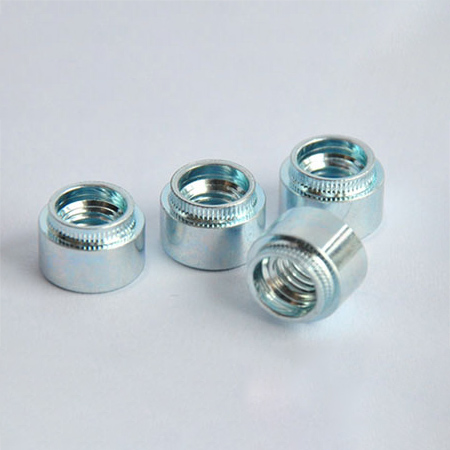The production of Flower Tooth Rivet Nuts involves a series of carefully orchestrated steps to create a reliable and sturdy fastening component. These nuts are commonly used in various industries, including automotive, construction, and aerospace, for their versatility and secure fastening capabilities. Below, we outline the general manufacturing process for Flower Tooth Rivet Nuts:
Material Selection: The first step is choosing the appropriate material for the Flower Tooth Rivet Nut. Common materials include steel, stainless steel, aluminum, and brass. The choice of material depends on the specific application's requirements, including load-bearing capacity, corrosion resistance, and environmental factors.
Wire Cutting: The selected material is cut into precise lengths using wire cutting machines. These lengths will form the raw material for the rivet nut production.
Cold Forming: Cold forming is a critical process that shapes the raw material into the desired rivet nut shape. During this process, the material is subjected to extreme pressure, causing it to deform without reaching its melting point. This method ensures the material's strength and integrity are maintained.
Thread Rolling: To create the internal threads of the rivet nut, thread rolling is employed. The cold-formed rivet nut is passed through a thread rolling machine that presses threads onto it. This results in strong, high-quality threads that provide reliable fastening.
Heat Treatment: Heat treatment is often used to enhance the hardness and durability of the Flower Tooth Rivet Nut. The nut is heated to a specific temperature and then rapidly cooled, a process known as quenching. This improves the material's mechanical properties.
Surface Treatment: Depending on the desired finish and properties, surface treatments like electroplating, galvanizing, or passivation may be applied to improve corrosion resistance, appearance, or other specific requirements.
Quality Control: Throughout the manufacturing process, quality control measures are implemented to ensure that each Flower Tooth Rivet Nut meets the specified standards. This includes dimensional checks, thread quality inspection, and material composition analysis.
Packaging: After passing quality control, the rivet nuts are packaged according to customer requirements. They may be packaged in bulk or smaller quantities, with appropriate labeling and documentation.
Distribution: The finished Flower Tooth Rivet Nuts are ready for distribution to customers, where they will be used in a wide range of applications to provide secure and reliable fastening solutions.

It's worth noting that the exact manufacturing process may vary depending on the specific design and material requirements of the Flower Tooth Rivet Nut. manufacturers often tailor their processes to meet industry standards and customer needs, ensuring that the final product meets the highest quality and performance standards.